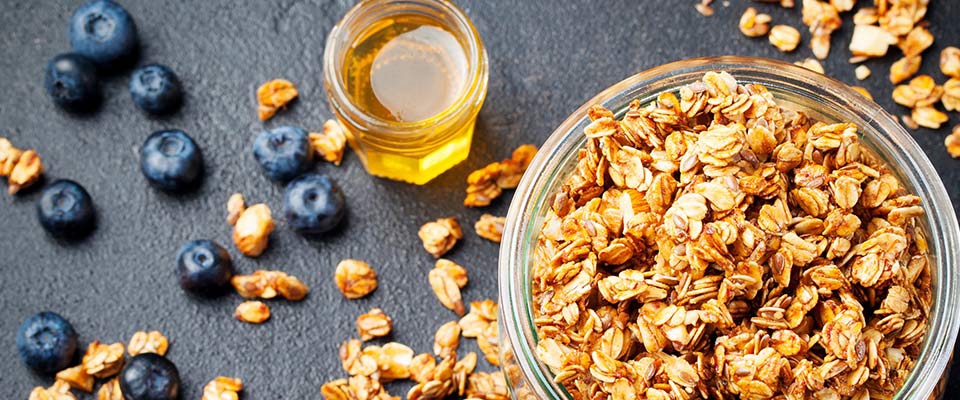ABC of Mediterranean Diet
With media and health professionals hailing it the secret to a longer life (and a smaller waist) the Mediterranean diet is increasingly adopted around the world. Knowledge leads to nourishment - so here’s how to get started yourself.
Ask any centenarian the secret to their long and healthy life and they’ll tell you that diet is a huge factor. With more and more eating the Mediterranean way living to 100 years old - the diet becomes increasingly topical every year.
Robust of olives, nuts, fruit, vegetables, fish, grains and cereals, the Mediterranean diet is reportedly imperative for life longevity, improved cardiovascular health, weight control and cognitive functioning. A diet approved so highly, in fact, that UNESCO consider it an intangible cultural heritage. But what is it that makes this way of eating so good for us?
What is the Mediterranean diet?
The Mediterranean diet isn’t complicated to follow, it focuses on a few basic staple food groups incorporated into everyday meals. The ingredients are readily available for those living in the Mediterranean. Here are the basics of the diet:
● Primarily plant-based foods, such as fruits, vegetables, whole grains, legumes and nuts
● Replacing butter and other less healthy fats with healthy fats such as olive oil
● Herbs and spices rather than salt to flavour meals
● Limiting red meat to no more than a few times a month
● Eating fish and poultry at least twice a week
● Drinking red wine in moderation (optional)
● Plenty of exercise
● Eating with friends and family
If you are considering dietary changes for weight loss here is what you should know.
How the Mediterranean diet works
Health professionals repeatedly emphasize how the Mediterranean diet is the healthiest and should be adapted by all adults to prevent chronic disease. From looking at the basics of the food groups, it’s clear that these ingredients are in their purest form, offering an abundance of nutrients and vitamins crucial for optimum health. Those on the diet eat around seven to ten portions of fruit and vegetables per day, opposed to higher portions of protein and carbohydrate. Combined with plenty of exercise this diet can produce nothing but good results.
What makes the Mediterranean diet healthy?

It’s clear that the Mediterranean munchers are onto something here. Let’s look at these food groups separately to understand the nutritional benefits:
● Fresh fruit:
Most fruit is low in fat, calories, sodium and protein, contain vitamin A and C, fibre and potassium, potassium helping to reduce blood pressure. Fruit contains no cholesterol.
● Fresh vegetable:
Health benefits of vegetables are enormous. Most are low in calories- with the exception of those rich in their own fats and oils such as avocados which still only hold 80 calories per 50 grams. No cholesterol, rich with vitamins and antioxidants and packed with fibre.
● Legumes:
Plenty of goodness here: high in fibre, manganese, thiamine (vitamin B1).
● Nuts and seeds:
Hello protein, healthy fats and high sources of minerals such as selenium (a brilliant stress-buster). It’s recommended eating no more than your own handful of nuts per day due to their high calorie content.
● Fish: A staple on the Med diet:
fish is packed with protein and low fat (some fish is rich in healthy fats). Oily fish such as salmon is also rich in vitamin B, D and Omega-3, aiding healthy cognitive functioning.
● Unrefined whole grains:
Processed grains go through a process which removes essential minerals and vitamins, without this process natural foods maintain the carbohydrates, iron and essential vitamins. Although the Mediterranean isn't gluten-free, these unrefined whole grains are less likely than processed grains to affect the gut bacteria and hence contribute towards gluten intolerance.
● Red wine:
The health benefits of alcohol have been debated for years - and it is certainly best limited. However, there continues to be an ongoing positiveness in red wine when drank in moderation. Red wine has tannins which contain procyanidins (cancer preventative).

Health benefits of the Mediterranean diet:
● Fight against heart disease: This diet can greatly reduce the fight against cardiovascular disease, heart attacks and heart disease. Every single food group attributes to it in some way - even the wine which contains antioxidants. Any natural fats works towards lowering cholesterol which again improves cardio health.
● Cancer preventative:
Get an image of the Mediterranean diet and it’s hard not to think about the food’s aesthetic attractiveness. Think of the diet as Van Gogh’s palette from which he created his masterpieces, a plethora of colour. This rainbow of fruits and vegetables (especially red ones) contain powerful nutrients which have been studied and proven to prevent cancer.
● Helps fight diabetes:
This diet is naturally low in sugar. The fresh fruit and vegetables are high in fibre and help reduce the blood sugar levels.
● Weight control:
Larger measures of natural fats such as olive and nut oils can put people trying to lose weight off the Mediterranean diet. However, it’s generally low in fat and contains less calories compared to the general diet of the UK, USA and various other countries. From the fruit to the honey, sugars in the diet are all natural too. Bread is not processed either, contributing to weight control.
● Cognitive functioning:
We’ve known about the benefits of Omega-3 fish oils for improved cognitive functioning, so it should be no surprise to hear that the Mediterranean diet is excellent in preventing cognitive deterioration. The diet on the whole is holistic in it’s offerings and the regular consumption of healthy fish is most beneficial for brain functioning.
Research has shown that the Mediterranean diet may help conditions linked with brain aging, linking the consumption of Omega-3 foods and a low-fat, low-sugar diet to this. Locals in Sicily and Greece, (where people are living long healthy lives well past their 100th year) report that the life longevity is no arduous task - it’s down to exercise and a healthy diet.
